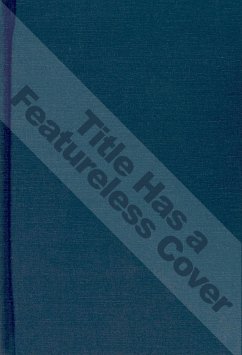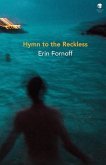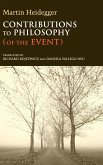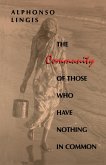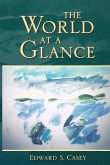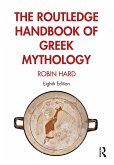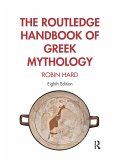Martin Heidegger
Holderlin's Hymn "The Ister"
Martin Heidegger
Holderlin's Hymn "The Ister"
- Gebundenes Buch
- Merkliste
- Auf die Merkliste
- Bewerten Bewerten
- Teilen
- Produkt teilen
- Produkterinnerung
- Produkterinnerung
Readings of Germany's leading Romantic poet by Germany's foremost 20th-century philosopher
Andere Kunden interessierten sich auch für
![Hymn to the Reckless Hymn to the Reckless]() Erin FornoffHymn to the Reckless16,99 €
Erin FornoffHymn to the Reckless16,99 €![The Collected Poems of G. K. Chesterton The Collected Poems of G. K. Chesterton]() G K ChestertonThe Collected Poems of G. K. Chesterton23,99 €
G K ChestertonThe Collected Poems of G. K. Chesterton23,99 €![Contributions to Philosophy (Of the Event) Contributions to Philosophy (Of the Event)]() Martin HeideggerContributions to Philosophy (Of the Event)61,99 €
Martin HeideggerContributions to Philosophy (Of the Event)61,99 €![The Community of Those Who Have Nothing in Common The Community of Those Who Have Nothing in Common]() Alphonso LingisThe Community of Those Who Have Nothing in Common59,99 €
Alphonso LingisThe Community of Those Who Have Nothing in Common59,99 €![The World at a Glance The World at a Glance]() Edward S. CaseyThe World at a Glance35,99 €
Edward S. CaseyThe World at a Glance35,99 €![The Routledge Handbook of Greek Mythology The Routledge Handbook of Greek Mythology]() Robin HardThe Routledge Handbook of Greek Mythology261,99 €
Robin HardThe Routledge Handbook of Greek Mythology261,99 €![The Routledge Handbook of Greek Mythology The Routledge Handbook of Greek Mythology]() Robin HardThe Routledge Handbook of Greek Mythology49,99 €
Robin HardThe Routledge Handbook of Greek Mythology49,99 €-
-
-
Readings of Germany's leading Romantic poet by Germany's foremost 20th-century philosopher
Hinweis: Dieser Artikel kann nur an eine deutsche Lieferadresse ausgeliefert werden.
Hinweis: Dieser Artikel kann nur an eine deutsche Lieferadresse ausgeliefert werden.
Produktdetails
- Produktdetails
- Studies in Continental Thought
- Verlag: Indiana University Press
- Seitenzahl: 200
- Erscheinungstermin: 22. September 1996
- Englisch
- Abmessung: 242mm x 161mm x 22mm
- Gewicht: 454g
- ISBN-13: 9780253330642
- ISBN-10: 0253330645
- Artikelnr.: 21852205
- Herstellerkennzeichnung
- Libri GmbH
- Europaallee 1
- 36244 Bad Hersfeld
- gpsr@libri.de
- Studies in Continental Thought
- Verlag: Indiana University Press
- Seitenzahl: 200
- Erscheinungstermin: 22. September 1996
- Englisch
- Abmessung: 242mm x 161mm x 22mm
- Gewicht: 454g
- ISBN-13: 9780253330642
- ISBN-10: 0253330645
- Artikelnr.: 21852205
- Herstellerkennzeichnung
- Libri GmbH
- Europaallee 1
- 36244 Bad Hersfeld
- gpsr@libri.de
William McNeill is Assistant Professor of Philosophy at DePaul University and translator (with Nicholas Walker) of The Fundamental Concepts of Metaphysics: World, Finitude, Solitude by Martin Heidegger. Julia Davis is Research Associate at Whitman College and former Fulbright Fellow at Freiburg University.
Translators' Foreword
Part One: Poetizing the Essence of the Rivers The Isther Hymn
1. The theme of the lecture course: remarks on Holderlin's hymnal poetry
2. Hymnal poetry as poetizing the essence of the rivers
Review
3. The metaphysical interpretation of art
4. Holderlin's poetry as not concerned with images in a symbolic or
metaphysical sense. The concealed essence of the river
5. The river as the locality of human abode
Review
6. The rivers as "vanishing" and "full of intimation" in "voice of the
People"
Review
7. The river as the locality of journeying and the journeying of locality
8. The questionableness of the metaphysical representation of space and
time
9. Becoming homely as the care of Holderlin's poetry-the encounter between
the foreign and one's own as the fundamental truth of history-Holderlin's
dialogue with Pindar and Sophocles
Part Two: The Greek Interpretation of Human Beings in Sophocles' Antigone
10. The human being: the uncanniest of the uncanny. (The entry song of the
chorus of elders and the first stationary song)
Review
11. The poetic dialogue between Holderlin and Sophocles
12. The meaning of (Explication of the commencement of the choral ode)
Review
13. The uncanny as the ground of human beings. (Continued explication of
Review
14. Further essential determinations of the human being
Review
15. Continued explication of the essence of the
16. The expulsion of the human being as the most uncanny being. (The
relation of the closing words to the introductory words of the choral song)
Review
17. The introductory dialogue between Antigone and Ismene
18. The hearth as being. (Renewed meditation on the commencement of the
choral ode and on the closing words)
Review
19. Continued discussion of the hearth as being
20. Becoming homely in being unhomely-the ambiguity of being unhomely. The
truth of the choral ode as the innermost middle of the tragedy.
Part Three: Holderlin's Poetizing of the Essence of The Poet as Demigod
21. Holderlin's river poetry and the choral ode from Sophocles-a historical
becoming homely in each case
22. The historically grounding spirit. Explication of the lines: "namely at
home is spirit not at the commencement, not at the source. The home
consumes it. Colony, and bold forgetting spirit loves. Our flowers and the
shades of our woods gladden the one who languishes. The besouler would
almost be scorched"
23. Poetizing the essence of poetry-the poetic spirit as the spirit of the
river. The holy as that which is to be poetized
24. The rivers as the poets who found the poetic, upon whose ground human
beings dwell
25. The poet as the enigmatic "sign" who lets appear that which is to be
shown. The holy as the fire that ignites the poet. The meaning of naming
the gods.
26. Poetizing founding builds the stairs upon which the heavenly descend
Concluding Remark-"Is There a Measure on Earth?
Editor's Epilogue
Translators' Notes
Glossary
English-German
German-English
Part One: Poetizing the Essence of the Rivers The Isther Hymn
1. The theme of the lecture course: remarks on Holderlin's hymnal poetry
2. Hymnal poetry as poetizing the essence of the rivers
Review
3. The metaphysical interpretation of art
4. Holderlin's poetry as not concerned with images in a symbolic or
metaphysical sense. The concealed essence of the river
5. The river as the locality of human abode
Review
6. The rivers as "vanishing" and "full of intimation" in "voice of the
People"
Review
7. The river as the locality of journeying and the journeying of locality
8. The questionableness of the metaphysical representation of space and
time
9. Becoming homely as the care of Holderlin's poetry-the encounter between
the foreign and one's own as the fundamental truth of history-Holderlin's
dialogue with Pindar and Sophocles
Part Two: The Greek Interpretation of Human Beings in Sophocles' Antigone
10. The human being: the uncanniest of the uncanny. (The entry song of the
chorus of elders and the first stationary song)
Review
11. The poetic dialogue between Holderlin and Sophocles
12. The meaning of (Explication of the commencement of the choral ode)
Review
13. The uncanny as the ground of human beings. (Continued explication of
Review
14. Further essential determinations of the human being
Review
15. Continued explication of the essence of the
16. The expulsion of the human being as the most uncanny being. (The
relation of the closing words to the introductory words of the choral song)
Review
17. The introductory dialogue between Antigone and Ismene
18. The hearth as being. (Renewed meditation on the commencement of the
choral ode and on the closing words)
Review
19. Continued discussion of the hearth as being
20. Becoming homely in being unhomely-the ambiguity of being unhomely. The
truth of the choral ode as the innermost middle of the tragedy.
Part Three: Holderlin's Poetizing of the Essence of The Poet as Demigod
21. Holderlin's river poetry and the choral ode from Sophocles-a historical
becoming homely in each case
22. The historically grounding spirit. Explication of the lines: "namely at
home is spirit not at the commencement, not at the source. The home
consumes it. Colony, and bold forgetting spirit loves. Our flowers and the
shades of our woods gladden the one who languishes. The besouler would
almost be scorched"
23. Poetizing the essence of poetry-the poetic spirit as the spirit of the
river. The holy as that which is to be poetized
24. The rivers as the poets who found the poetic, upon whose ground human
beings dwell
25. The poet as the enigmatic "sign" who lets appear that which is to be
shown. The holy as the fire that ignites the poet. The meaning of naming
the gods.
26. Poetizing founding builds the stairs upon which the heavenly descend
Concluding Remark-"Is There a Measure on Earth?
Editor's Epilogue
Translators' Notes
Glossary
English-German
German-English
Translators' Foreword
Part One: Poetizing the Essence of the Rivers The Isther Hymn
1. The theme of the lecture course: remarks on Holderlin's hymnal poetry
2. Hymnal poetry as poetizing the essence of the rivers
Review
3. The metaphysical interpretation of art
4. Holderlin's poetry as not concerned with images in a symbolic or
metaphysical sense. The concealed essence of the river
5. The river as the locality of human abode
Review
6. The rivers as "vanishing" and "full of intimation" in "voice of the
People"
Review
7. The river as the locality of journeying and the journeying of locality
8. The questionableness of the metaphysical representation of space and
time
9. Becoming homely as the care of Holderlin's poetry-the encounter between
the foreign and one's own as the fundamental truth of history-Holderlin's
dialogue with Pindar and Sophocles
Part Two: The Greek Interpretation of Human Beings in Sophocles' Antigone
10. The human being: the uncanniest of the uncanny. (The entry song of the
chorus of elders and the first stationary song)
Review
11. The poetic dialogue between Holderlin and Sophocles
12. The meaning of (Explication of the commencement of the choral ode)
Review
13. The uncanny as the ground of human beings. (Continued explication of
Review
14. Further essential determinations of the human being
Review
15. Continued explication of the essence of the
16. The expulsion of the human being as the most uncanny being. (The
relation of the closing words to the introductory words of the choral song)
Review
17. The introductory dialogue between Antigone and Ismene
18. The hearth as being. (Renewed meditation on the commencement of the
choral ode and on the closing words)
Review
19. Continued discussion of the hearth as being
20. Becoming homely in being unhomely-the ambiguity of being unhomely. The
truth of the choral ode as the innermost middle of the tragedy.
Part Three: Holderlin's Poetizing of the Essence of The Poet as Demigod
21. Holderlin's river poetry and the choral ode from Sophocles-a historical
becoming homely in each case
22. The historically grounding spirit. Explication of the lines: "namely at
home is spirit not at the commencement, not at the source. The home
consumes it. Colony, and bold forgetting spirit loves. Our flowers and the
shades of our woods gladden the one who languishes. The besouler would
almost be scorched"
23. Poetizing the essence of poetry-the poetic spirit as the spirit of the
river. The holy as that which is to be poetized
24. The rivers as the poets who found the poetic, upon whose ground human
beings dwell
25. The poet as the enigmatic "sign" who lets appear that which is to be
shown. The holy as the fire that ignites the poet. The meaning of naming
the gods.
26. Poetizing founding builds the stairs upon which the heavenly descend
Concluding Remark-"Is There a Measure on Earth?
Editor's Epilogue
Translators' Notes
Glossary
English-German
German-English
Part One: Poetizing the Essence of the Rivers The Isther Hymn
1. The theme of the lecture course: remarks on Holderlin's hymnal poetry
2. Hymnal poetry as poetizing the essence of the rivers
Review
3. The metaphysical interpretation of art
4. Holderlin's poetry as not concerned with images in a symbolic or
metaphysical sense. The concealed essence of the river
5. The river as the locality of human abode
Review
6. The rivers as "vanishing" and "full of intimation" in "voice of the
People"
Review
7. The river as the locality of journeying and the journeying of locality
8. The questionableness of the metaphysical representation of space and
time
9. Becoming homely as the care of Holderlin's poetry-the encounter between
the foreign and one's own as the fundamental truth of history-Holderlin's
dialogue with Pindar and Sophocles
Part Two: The Greek Interpretation of Human Beings in Sophocles' Antigone
10. The human being: the uncanniest of the uncanny. (The entry song of the
chorus of elders and the first stationary song)
Review
11. The poetic dialogue between Holderlin and Sophocles
12. The meaning of (Explication of the commencement of the choral ode)
Review
13. The uncanny as the ground of human beings. (Continued explication of
Review
14. Further essential determinations of the human being
Review
15. Continued explication of the essence of the
16. The expulsion of the human being as the most uncanny being. (The
relation of the closing words to the introductory words of the choral song)
Review
17. The introductory dialogue between Antigone and Ismene
18. The hearth as being. (Renewed meditation on the commencement of the
choral ode and on the closing words)
Review
19. Continued discussion of the hearth as being
20. Becoming homely in being unhomely-the ambiguity of being unhomely. The
truth of the choral ode as the innermost middle of the tragedy.
Part Three: Holderlin's Poetizing of the Essence of The Poet as Demigod
21. Holderlin's river poetry and the choral ode from Sophocles-a historical
becoming homely in each case
22. The historically grounding spirit. Explication of the lines: "namely at
home is spirit not at the commencement, not at the source. The home
consumes it. Colony, and bold forgetting spirit loves. Our flowers and the
shades of our woods gladden the one who languishes. The besouler would
almost be scorched"
23. Poetizing the essence of poetry-the poetic spirit as the spirit of the
river. The holy as that which is to be poetized
24. The rivers as the poets who found the poetic, upon whose ground human
beings dwell
25. The poet as the enigmatic "sign" who lets appear that which is to be
shown. The holy as the fire that ignites the poet. The meaning of naming
the gods.
26. Poetizing founding builds the stairs upon which the heavenly descend
Concluding Remark-"Is There a Measure on Earth?
Editor's Epilogue
Translators' Notes
Glossary
English-German
German-English

